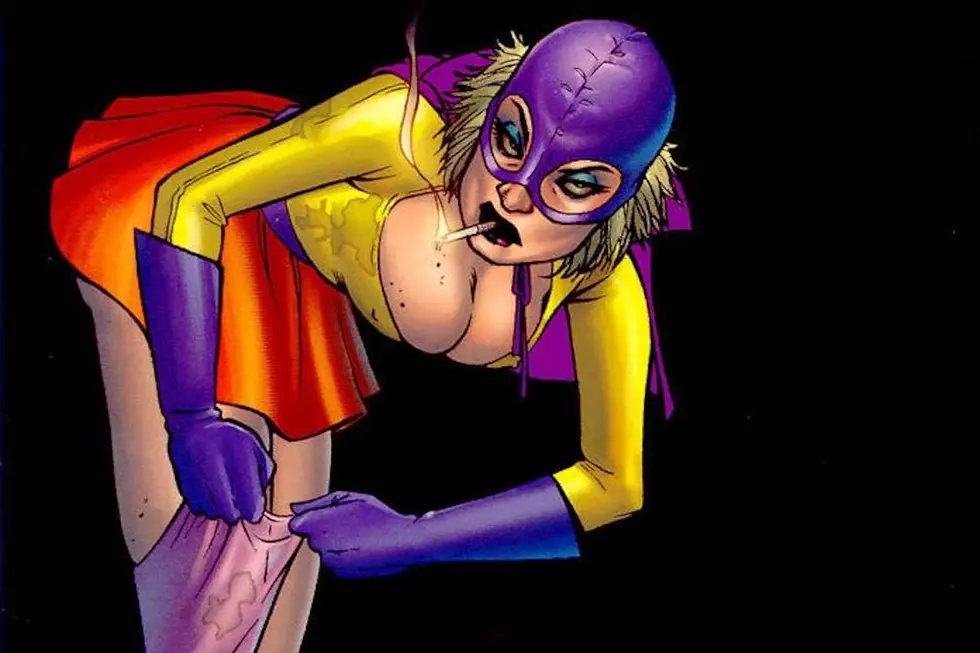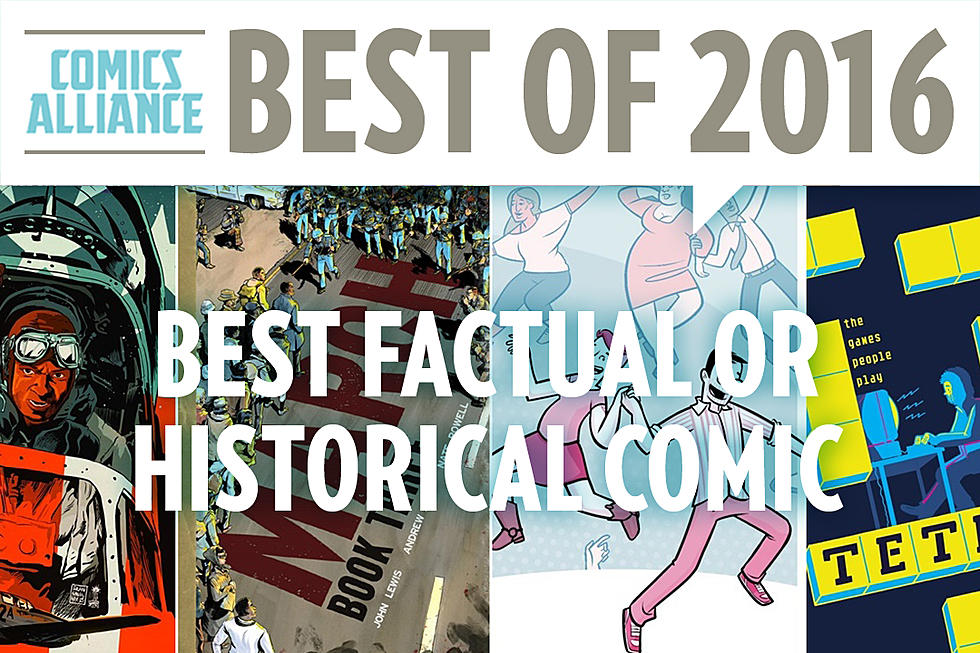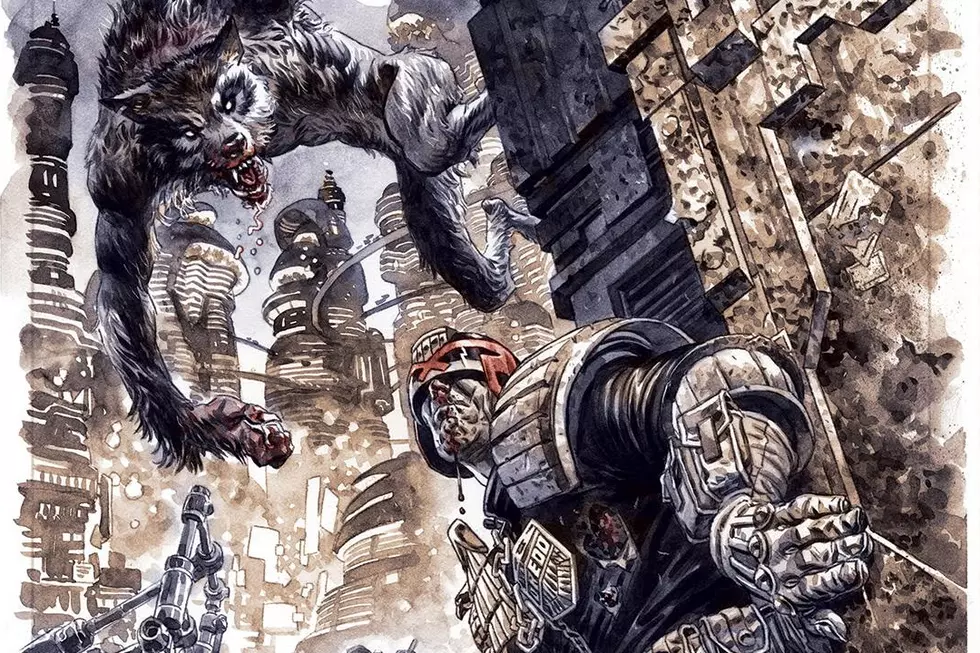
Ask Chris #155: Closing Time
Q: What's your favorite final issue of a comic series or run? -- @supergeekmike
A: Back when I was working at the comic book store, my friend Scott once told me that if I really wanted to know what a series was all about, all I had to do was read the first issue and the last issue. Admittedly, this is the same friend who told me that I really ought to start reading Tarot: Witch of the Black Rose, but he had a good point. On those rare occasions in comics where someone can actually build to a last issue, that's where everything about the series can come together. And the results can be pretty great.
Pinning down the best last issue is surprisingly difficult, mostly because I haven't finished that run of Punisher 2099 yet, and I'm pretty sure it's going to be a strong contender. Really, though, the more I think about it, the more great ones pop into my head that have a pretty strong claim to the throne.
Suicide Squad, for example, deals with stuff in #66 that's been building since the very first issue. John Ostrander, Kim Yale and Geof Isherwood take the premise of the book to its literal conclusion, with Count Vertigo and Deadshot -- two men with with death wishes who have survived the Squad for over five years at that point -- standing on a hillside casually debating whether Vertigo is going to ask Deadshot to kill him. It's strange and beautiful and poignant in a way that resonates with the themes and characters that they've been spending so long building, and the blunt, clipped way that it ends is just about perfect for that comic.
The same goes for James Robinson and Peter Snejbjerg's last issue of Starman. I might not agree with the themes of Jack Knight having to move past superheroics in order to really grow up and become his own man -- which, considering that it was the last thing Robinson wrote before he left comics in to take up screenwriting, always struck me as a message about Robinson wanting to move past superheroes -- but there's no arguing that it's the perfect ending for that character. He'd been playing with the ideas of family and legacy for eighty issues at that point, and having Jack decide that he needed to devote his life to his son and honor his father by becoming a father was great. Plus, the idea that he passed the metaphorical torch/literal cosmic rod to Courtney Whitmore also makes for a great moment, as it's Robinson and his creation, one of the stars of DC in the '90s, handing things off to Geoff Johns, who was undoubtedly DC's future, and his creation.
Those are great comics, and there are other solid endings out there, too. The last issue of Morrison's run on JLA is one of the few comics that reliably turns on the waterworks every time I read it, Simonson's last issue of Thor caps off one of the best runs ever, and Warren Ellis and Stuart Immonen's last issue of Nextwave, like every issue of Nextwave, is essentially a perfect comic book. That said, there's one final issue that sticks out over everything else.
Hitman #60. Closing Time.
Between 1995 and 2005, you could make a pretty solid case for Garth Ennis as the single best comic book writer in the industry. Don't get me wrong, he's still great, but during that ten-year span, he was pretty much knocking out a masterpiece every time he sat down at a keyboard -- and doing at least two, sometimes three or four at the same time. He was working with phenomenally talented artists like John McCrea, Steve Dillon and Gary Erskine, and they were putting out books like Preacher, Punisher, Hellblazer, The Demon and War Story every single month, and they're all great. That's insane.
It's worth noting that Preacher and Punisher both have pretty amazing last issues -- Punisher, in fact, has about three of them -- but Ennis and McCrea's Hitman is far and away my favorite, and one of my favorite comics of all time, period.
The thing about Ennis is that as much as he rose to fame on weird, gross-out stuff like Arseface and the eternally vomiting Allfather D'Aronique in Preacher or the (fantastic) "Zombie Night at the Gotham Aquarium" story in Hitman, and as much as he's a guy who "hates superheroes" to the point where he did an entire story arc about how stupid he thought Green Lantern was in a book published by DC Comics, his comics have more heart and genuine emotion in them than anybody else I can think of. There's a theme that runs through a lot of his work, and it's not a hard one to figure out: No matter what kind of hell comes after you, you stick by your friends because that's the only thing you have in this world.
Well, except Punisher. The theme of that one is basically just "force of nature in a shirt with a skull on it murders people who need to be murdered for about a hundred and fifteen issues." Give or take.
Hitman, however, falls into the former category, and the brilliant thing about it is that Ennis and McCrea strike this perfect balance of comedy and tragedy for the first half, and then start sliding the scales toward tragedy. There are decisions that Tommy Monaghan makes during genuinely hilarious scenes early in the book that set things in motion that play out twenty or thirty issues down the line, and it gets grimmer all the time.
Not that it's particularly cheery to begin with, you understand.
I don't know if Ennis and McCrea had only committed to five years on the book or if they just knew all along how long they intended to go with it, but there's a shift right at #39 where they just straight up start killing off the entire cast. There's never really any doubt about how Tommy and his crew are going to end up, but from that moment, it's only a matter of time. The next 21 issues all count down to that final act, and they do it perfectly.
It is, without question, some of the strongest character stuff that I've ever read in comics, superhero or otherwise. Ennis is one of the few writers who's talented enough to get to a point where characters are so exhausted by what they've been doing that they can just say whatever they're feeling without any level of subtlety, and it comes off as raw and honest rather than just a bunch of flat characters shouting their feelings at each other, and McCrea's the perfect person to draw it. As good as he is at drawing exaggerated characters like Baytor and Nightfist (he will hit you with his fist!) and the slapstick comedy stuff, he gives the characters a weight and a weariness throughout the whole thing that makes them feel real. Which, for a book about a guy who has X-Ray vision because alien parasites gave him jacked-up eyes during Bloodlines, is a hell of an achievement.
It's one of those final issues where you can see what's going to happen a mile away, but it draws you in and constructs itself so well that it's impossible to stop reading. I'm a sucker for those "never the end!" issues where the hero cheerfully flies into cancellation, but Ennis and McCrea don't waste anyone's time pretending like that's an option. It's not that it's not a happy ending, and -- spoiler warning! -- even though all the good guys die in violent, fairly miserable ways, it's not really a sad ending, either.
It's the only ending.
It was never going to go another way, because that's not how this story works, and it's not how it was ever supposed to work. It all comes to an end in the only way that it can, because of how well it's crafted right from the beginning.
Unless, of course, you read it in numerical order, in which case the last one you'll get to is Hitman #1,000,000, the issue that contains the phrase "I turned my ass into a hand grenade!" Either way, it's a pretty solid ending.
Ask Chris art by Erica Henderson. If you’ve got a question you’d like to see Chris tackle in a future column, just send it to @theisb on Twitter with the hashtag #AskChris, or send an email to chris@comicsalliance.com with [Ask Chris] in the subject line!
More From ComicsAlliance








![Rogues’ Gallery: Who Is The Ultimate ‘Preacher’ Enemy? [Poll]](http://townsquare.media/site/622/files/2016/11/Preacher-Vote.jpg?w=980&q=75)
